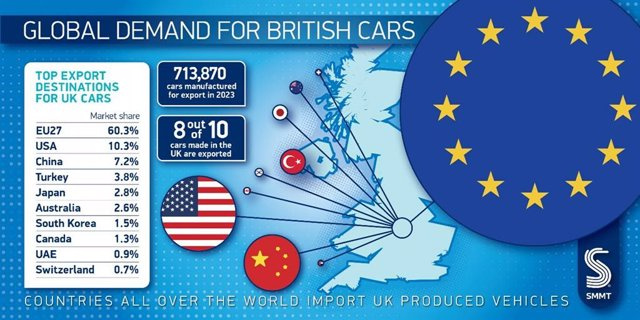(Information sent by the signatory company)
SMMT- Vehicle production in the United Kingdom is one million vehicles and welcomes an investment boost of 23.7 billion pounds
LONDON, January 24, 2024 /PRNewswire/ -- Vehicle production in the United Kingdom reached 1,025,474 units in 2023, according to the latest figures published today by the Society of Motor Manufacturers and Traders (SMMT). With 905,117 automobiles and 120,357 commercial vehicles produced, production increased by 17.0% compared to the previous year. Easing pandemic-related challenges, from chip shortages to lockdowns, and increased production of electrified models have combined to push annual production above one million for the first time since 2019.[1]
The good results in December for both automobile manufacturing, with a year-on-year increase of 20.7%, and for commercial vehicle volumes, with an increase of 80.3%, completed a positive year, in which there was a revival of the fortunes of the industry. Seven all-new, next-generation models entered production in 2023, including at the recently reopened Ellesmere Port EV-only plant,[2] while public and private investment commitments worth £23.7bn were made ( more than in the previous seven years combined) from Cowley to Sunderland; gigafactories to R&D facilities.[3]
These commitments will drive green economic growth, create jobs across the country and transition the sector towards electrified vehicle manufacturing, which has already reached record levels in 2023. UK production of battery electric vehicles (BEVs), hybrids plug-in vehicles (PHEV) and hybrids (HEV) increased to 346,451 units, 48.0% more than the previous year and represented almost two-fifths (38.3%) of total production.
Overall, UK car production increased by 16.8% in 2023, its best growth rate since 2010, with the total retail value of all models manufactured rising to more than £50 billion.[4] ] While 191,247 cars were built for domestic buyers, the majority of production was shipped overseas, demonstrating the contribution car exports make to the UK economy. Year on year, exports increased by 17.6% compared to a 13.7% increase in production for the British market.
The EU remained by far the largest global market for the sector, absorbing 60.3% of exports, with shipments increasing by almost a quarter (23.2%) to 430,411 units. The United States was the next most important destination with a 10.3% share of exports (73,571 units), followed by China with 7.2% (51,202 units), even though shipments to both fell by -9 .1% and -2.7% respectively. Turkey, by contrast, saw exports rise by 223.8% to 27,346 units, making it the UK's fourth largest global market, ahead of Japan, Australia, South Korea, Canada, United Arab Emirates and Switzerland.
Mike Hawes, chief executive of SMMT, said, "Easing supply chain challenges, the introduction of new models and a huge £23.7bn investment will see UK vehicle production firmly back on track in 2023. The industry will now focus on delivering on these commitments, transitioning the sector to electricity and increasing the supply chain. With global competition as fierce as ever and amid rising geopolitical tensions, both the government and the "The industry must remain singularly focused on competitiveness, with all the jobs and growth that will bring. We are in a much better position than a year ago, but the challenges are relentless."
Despite difficult market conditions, British specialist, luxury and performance car makers had another excellent year, with combined volumes up 6.3% to 34,613 units, worth an estimated £7.1bn .[4] Two new high-performance electric models have entered production, at Goodwood and Hethel, demonstrating how manufacturers across the sector are embracing electrification.
The sector also received a boost at the end of 2023 with the postponement of stricter rules of origin for batteries and electric vehicles traded between the UK and the EU. The move will help safeguard the competitiveness of the sector in the UK and Europe, providing valuable time for local production of batteries and associated components to increase.
2024 is a crucial year for this to happen, but headwinds remain, most immediately with attacks on shipping in the Red Sea raising the specter of delays and cost pressures. However, with the looming threat of the UK-EU tariff rules of origin being breached, the latest independent outlook forecasts UK car and light van production to rise by around 3% in 2024, up to 1.04 million units, with the potential to exceed 1.2 million units by the end of this decade.
To achieve this, the UK must ensure it remains competitive, so the upcoming budget is an opportunity for the government to introduce measures to boost the sector. These should include expanding the Climate Change Agreements so that electric vehicle battery manufacturing and its associated supply chain are eligible for aid; make green energy widely available and affordable; fulfill commitments to improve network connections; and take steps to close critical employment and skills gaps.
Rapid delivery of the government's Advanced Manufacturing Plan, full implementation of the Harrington Report recommendations, plus a trade policy that puts automotive at the center of all future negotiations, would also help the UK consolidate its recovery and become a world leader in the production of increasingly electrified vehicles.
Notes to editors
[1]: 1,303,135 cars and 78,270 commercial vehicles made in 2019 [2]: Brand models: Aston Martin, Lotus, Rolls-Royce, Stellantis and Alexander Dennis[3]: SMMT calculations based on public investment commitments and publicly announced private companies in UK car production and R&D by 2023 from brands including, but not limited to: MINI, JLR, Tata and Nissan. Total investment announced 2016-2022 inclusive: £16.2 billion. [4]: SMMT calculations based on RRP and publicly available information: £51.6 billion.
About SMMT and the UK motor industry
The Society of Motor Manufacturers and Traders (SMMT) is one of the UK's largest and most influential trade associations. It supports the interests of the UK automotive industry at home and abroad, promoting the industry to government, stakeholders and the media.
The car industry is a vital part of the UK economy and is instrumental in supporting the delivery of the Level Up, Net Zero Emissions, Moving Britain Globally and the Growth Plan agendas. Automotive-related manufacturing contributes £67bn of turnover and £14bn of added value to the UK economy, and typically invests around £3bn each year in R&D. With over 182,000 people employed in manufacturing and around 780,000 in total in the wider automotive industry, we account for 10% of total UK exports and more than 150 countries import UK-produced vehicles, generating £77 billion of trade.
More than 70 vehicle models are made in the UK by more than 25 manufacturers, plus a number of small-volume specialist manufacturers, supported by around 5,000 supply chain companies and some of the world's most skilled engineers. Many of these jobs are located outside London and the South East, with salaries around 14% higher than the UK average. The automotive sector also supports employment in other key sectors, including advertising, finance and logistics.
More details on UK motoring are available in SMMT's Motor Industry Facts publication at www.smmt.co.uk/reports/smmt-motor-industry-facts/
Broadcasters: SMMT has an ISDN studio and access to expert spokespersons, case studies and regional representatives.
High resolution graphics available through Dropbox: https://www.dropbox.com/scl/fo/56ww1iie7...
Photo - https://mma.prnewswire.com/media/2325932...
View original content: https://www.prnewswire.com/es/comunicados-de-prensa/smmt--la-produccion-de-vehiculos-en-reino-unido-es-de-un-millon-de-vehiculos-302043649.html













